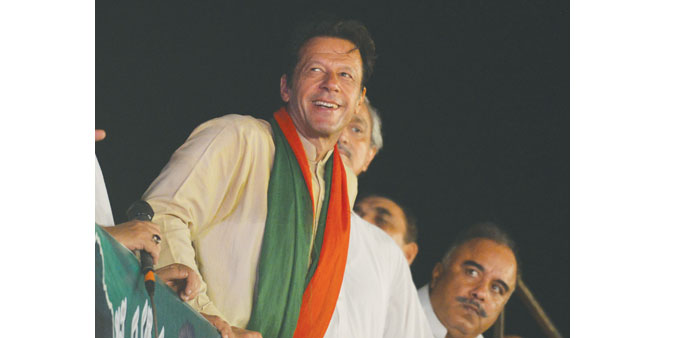DPA/Reuters
Islamabad
Opposition leaders in Pakistan yesterday suspended talks with the government aimed at ending weeks of protests, following the arrests of demonstrators.
Former cricketing hero Imran Khan and cleric Tahirul Qadri launched separate protests on August 14, and thousands of their supporters set up camp in front of the parliament, calling for Prime Minister Nawaz Sharif to step down.
The two leaders were holding separate talks with government representatives to end the standoff, but suspended the process after the arrests of their activists.
Khan’s party leader Jehangir Tareen told reporters that hundreds of their activists had been arrested since Friday.
“We have decided to end the negotiations due to official high-handedness,” he said.
Qadri had on Friday night announced his decision to end the talks.
Neither Tareen nor Qadri provided the exact numbers of their arrested workers.
Interior Minister Nisar Ali Khan said that only those people were arrested who were involved in attacking official buildings and police during the protests.
Earlier, dozens of supporters of Khan and Qadri tried to free hundreds of detainees who were brought to a local court in prison vans. Broadcast images showed angry activists surrounding the vans and chanting slogans. They also deflated the tyre of one vehicle.
Islamabad police chief Tahir Alam warned all those attempting to free the detainees: “I will arrest you if you continue to interfere in the work of police.”
Geo TV reported that the police succeeding in pushing back the protesters and that about 100 detainees - mainly Khan’s supporters - were remanded to 14 days in custody.
While Khan says he is protesting against last year’s rigged elections that brought Sharif to power, Qadri says he wants socio-economic and political reforms in the country.
Earlier, a court ordered that 100 opposition activists be sent to jail for holding illegal protests and other violations, prompting a tense confrontation between demonstrators and police in the centre of the capital.
Yesterday, a crowd of demonstrators gathered outside a court in Islamabad in a protest against its decision to send 100 activists to jail for two weeks, with some trying to slash the tyres of a police van and shouting “Go, Nawaz, go!”
Although the crowd eventually left peacefully after a two-hour stand-off with police, the episode highlighted just how nervous both sides of the conflict remained after talks to resolve the crisis failed several times.
Protest leaders accuse Sharif of rigging last year’s election which brought him back to power in a landslide and say they will not back down until he resigns - a demand Sharif has repeatedly rejected.
“The end of the incumbent government’s rule is near,” Qadri told domestic media.
On Saturday night, the protest camp crowd in the so-called Red Zone - home to Sharif’s house, ministries and embassies - swelled to a few thousand people, with opposition leaders adamant in their call for the prime minister to resign.
“Now there is no room for further talks, after what the government has done to us,” Khan told the cheering crowd.
Although the government has warned it had the right to crack down to disperse the protesters, security forces protecting government buildings looked on and showed no sign of action.
For Sharif, the persistent protests come at a difficult time when his government is already under pressure for not doing enough to tackle deadly floods around the country which have killed 280 people and affected the lives of 2mn.
The confrontation turned violent last month, with thousands trying to storm Sharif’s house and briefly taking the state television channel off the air.
Violence in the usually quiet capital has alarmed many people in a nation where power has often changed hands though military coups rather than
elections.
The army, which has ruled Pakistan for more than half of its history, has stayed out of the conflict, urging both sides to find a political solution.
Yet, some ruling party officials have accused the military itself of instigating the unrest as a way of unsettling Sharif and exerting supremacy over him.
The army has denied it was meddling in civilian affairs, saying it is neutral. Late on Friday, an army spokesman once again repeated that the army had nothing to do with the conflict.
Few commentators think the army wants to seize power again but, even if Sharif survives, he would emerge significantly weakened and likely play second-fiddle to the army on key security and foreign policy issues.

